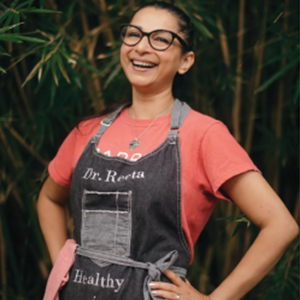Madhureeta Achari, M.D., ’92, Brain Foodie
Dr. Achari is out to prevent disease, not just treat it

February 20, 2017
Houston neurologist Madhureeta Achari is overseeing a delicate and potentially life-saving operation: the chopping of dandelion greens.
Every second Saturday, Dr. Reeta, as she’s known to her patients, trades her white physician’s coat for a denim apron, embroidered with the message “Healthy is Homemade.” With the help of her husband Bill, she sets up shop and cooks for the community, including her friends, neighbors, patients and farmers, at the Memorial Villages Farmers Market.
Today’s fare? Salads and dressings. Bad weather has wiped out the farmers’ delicate lettuces, so she improvises with hearty greens and leafy dark-green spinach, to which she adds a colorful mélange of chopped root vegetables: candy-striped beets, watermelon and daikon radishes, purple carrots, grated sweet potato and kohlrabi, adding a sprinkling of nuts for extra protein. To balance out the bitterness of the greens, she tosses in fresh, seasonal strawberries and dresses the salad with extra virgin olive oil and sweet, tangy, aged blackberry balsamic vinegar she sourced from a vendor a few feet away. A few visiting children, including a very spunky, self-appointed 6-year-old assistant, Olivia, take turns shaking the dressings. “Kids love to shake the dressings,” Achari points out, unnecessarily.
The market is nestled in the tony, decidedly not third-world Memorial area of Houston, as is her medical practice, just a half mile away. Yet for the past 10 years, she has been diagnosing third-world nutritional deficiencies. The culprit, she says, is misinformation. By restricting their intake of certain types of foods—through low-carb, Paleo or gluten-free diets, for instance—some people are depriving themselves of essential nutrients. “No one is trying to get ill,” she says, “but people are getting sick by trying to get healthy. We don’t need diets. Our appetites need to change. We need to learn how to eat a variety of foods.”
A year and a half ago, Achari diagnosed her first case of scurvy. A vitamin C deficiency that was once the scourge of mariners on the high seas, scurvy should be non-existent in the modern-day United States, where vitamin C–rich fruits and vegetables are plentiful. But Achari’s young, female patient exhibited classic symptoms—joint pain, rashes, abdominal pain, hair loss. So, suspending disbelief, Achari ordered vitamin testing and discovered the patient had no vitamin C in her system. “When the results came in, I asked her what she ate,” recalls Achari. “All she ate was canned chicken tortilla soup. She was busy; she liked it; and it was easy. From that day forward, I began asking all of my patients what they’re eating.”
Achari also has witnessed vitamin B and D deficiencies in patients on the Paleo Diet. “So many are existing on grilled chicken breast and broccoli,” she says. “You’ll lose weight, but after a while you’re going to start to feel bad.” She sees the same in patients who have eliminated wheat from their gluten-free diets. “It’s not the wheat—wheat is highly nutritious—it’s the gluten that’s added to our bread, to expedite rising.” Powdered superfoods, Achari says, are bewildering. “Why eat powdered blueberries? Eat blueberries!” And don’t even get her started on store-bought rotisserie chickens. “They add chicken fat and sugar!”
Achari has a keen interest in the politics of food. She’s appalled that the FDA allows makers of processed foods to add sugar as a texturizing ingredient without requiring them to report it on their labels. And she’s concerned that long shelf lives and prolonged cold storage are robbing consumers of nutritional value.
Shortly after she began shopping at the new farmers market, Achari found people were fascinated with the variety of local, seasonal produce being offered, but they didn’t know what to do with it. So, in January of last year, she began hosting monthly cooking demonstrations, arriving before the market opened to source her ingredients from the booths of local farmers.
Food and health have always been a part of Achari’s life. A fourth-generation physician, she was born in the state of Bihar in northern India, which she calls “the land of spice,” where fresh, flavorful food was abundant. “The milkman brought the cow each morning,” she recalls. “There were no electric ovens, so people would start the fires in the clay stoves in the morning, prepare the tea, and it was all about food, all day long.”
Her maternal grandfather was the town physician, caring for everyone from fishermen and farmers to the town maharaja. After her father—a fellow neurologist with whom she now shares a practice—graduated from medical school, the family moved to England, then to Houston, where, in 1971, he joined the Department of Neurology at Baylor College of Medicine. Achari’s brother is a Houston cardiologist, her mother a retired OB/GYN. She herself attended Rice before enrolling in the McGovern Medical School at the Texas Medical Center.
Despite her lifelong commitment to nutrition, Achari admits at times even she has strayed. “I am a recovering Taco Bell girl,” she says, “and I existed on Raspberry Zingers and vending-machine hot chocolate in medical school.” She acknowledges that healthy eating takes commitment and organization. “I say to my patients who say they don’t have the time or money to eat well, ‘pay now or pay later.’ Feed yourself well now, and you’ll spend less money on medical bills and enjoy a better quality of life.”
By raising awareness of the benefits of healthy eating, especially among our youth, Achari hopes to stave off epidemics of diabetes, coronary heart disease and childhood obesity. “As physicians, we are supposed to be about health. Yes, we’re there to treat illness, but if we can prevent that illness, isn’t that the best thing we can do?”
This news release was originally distributed here